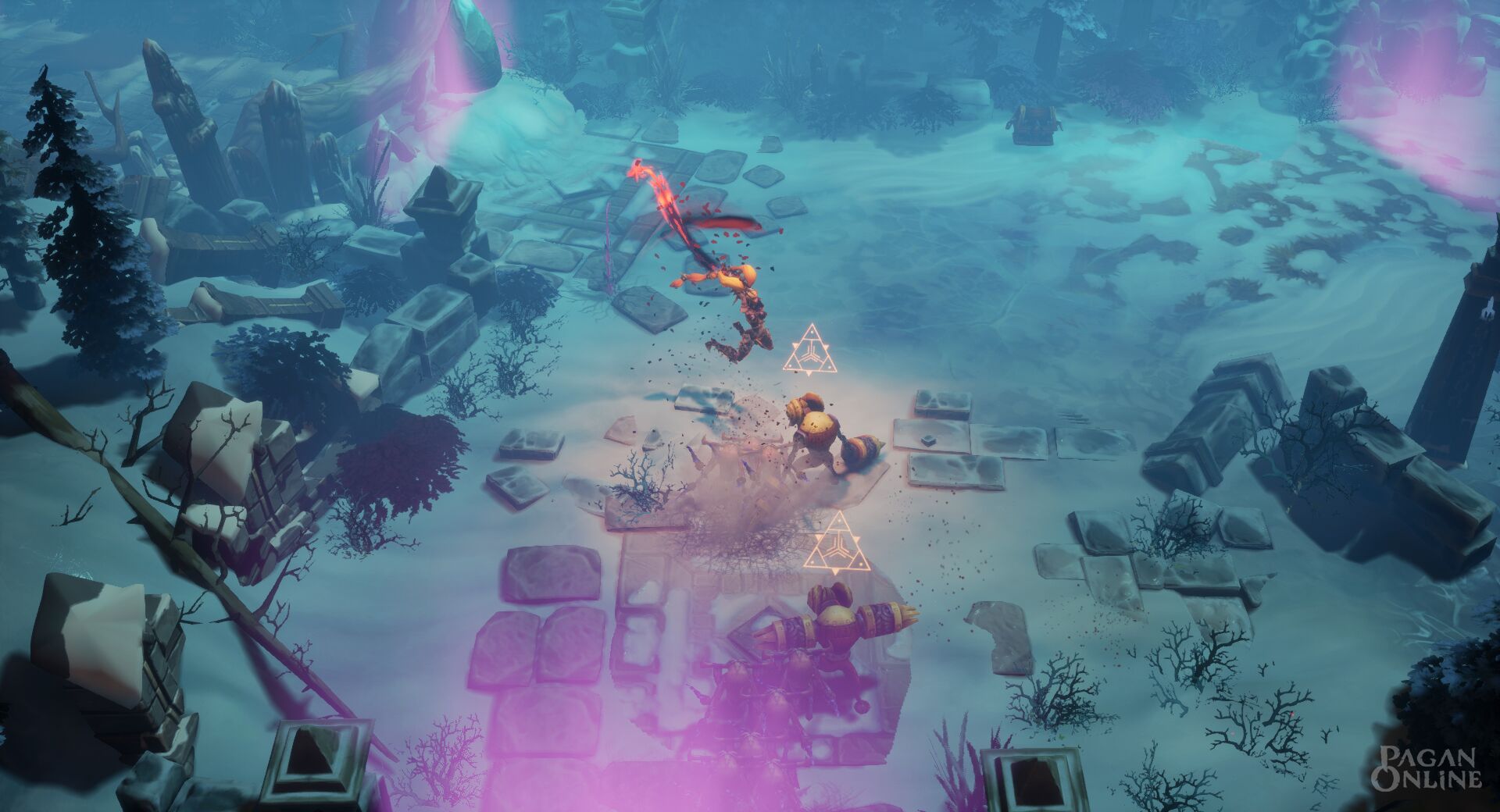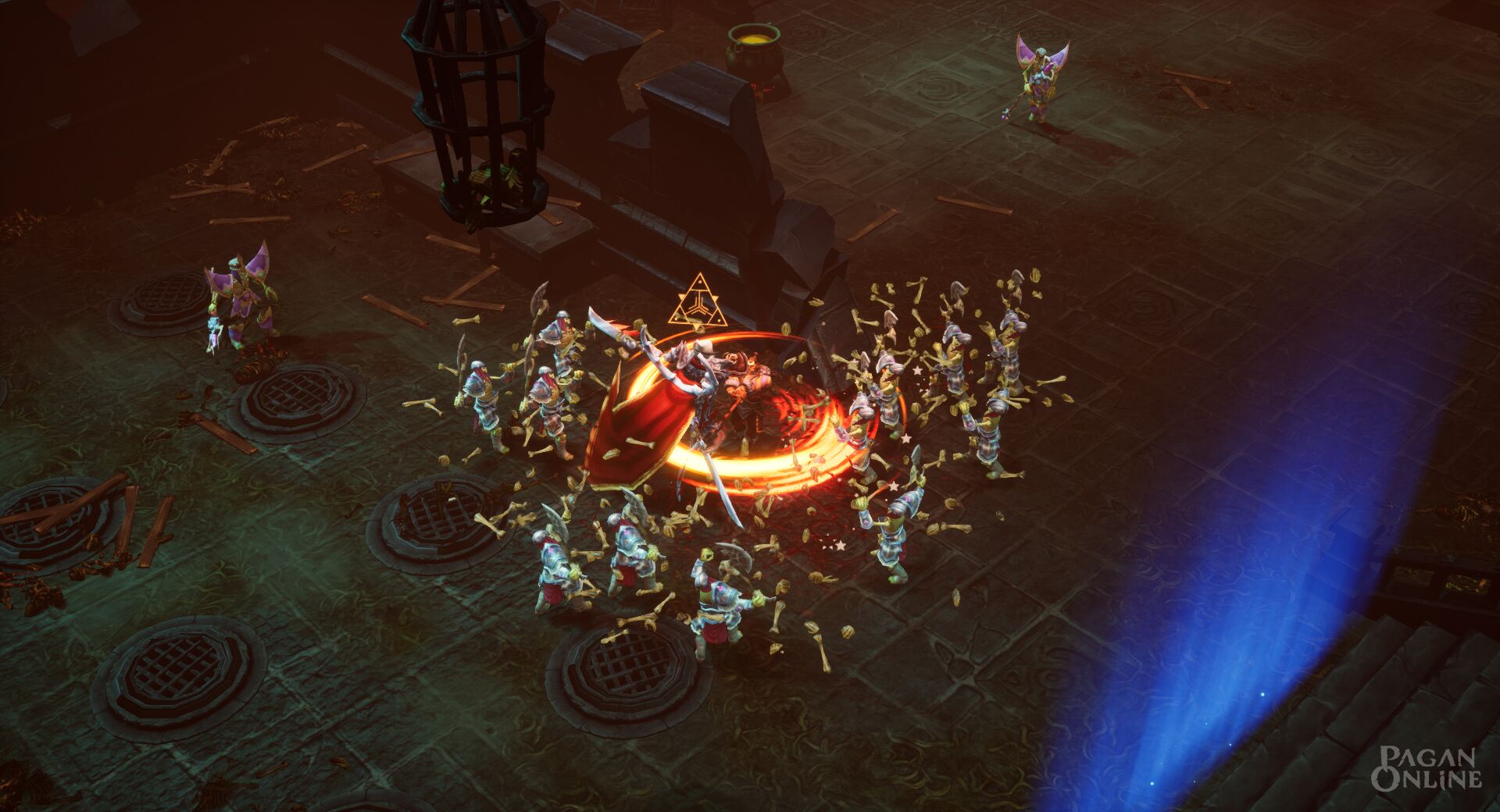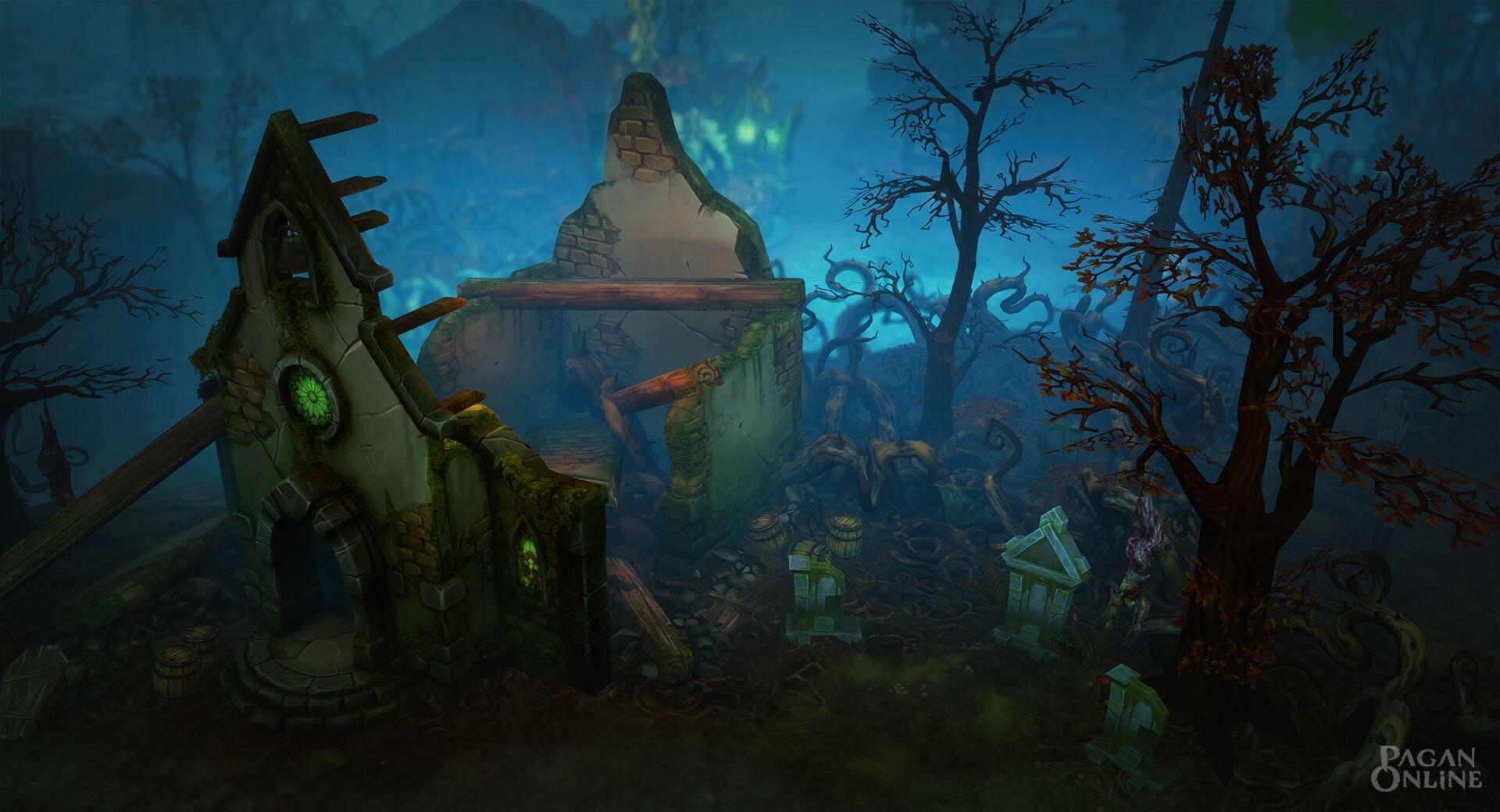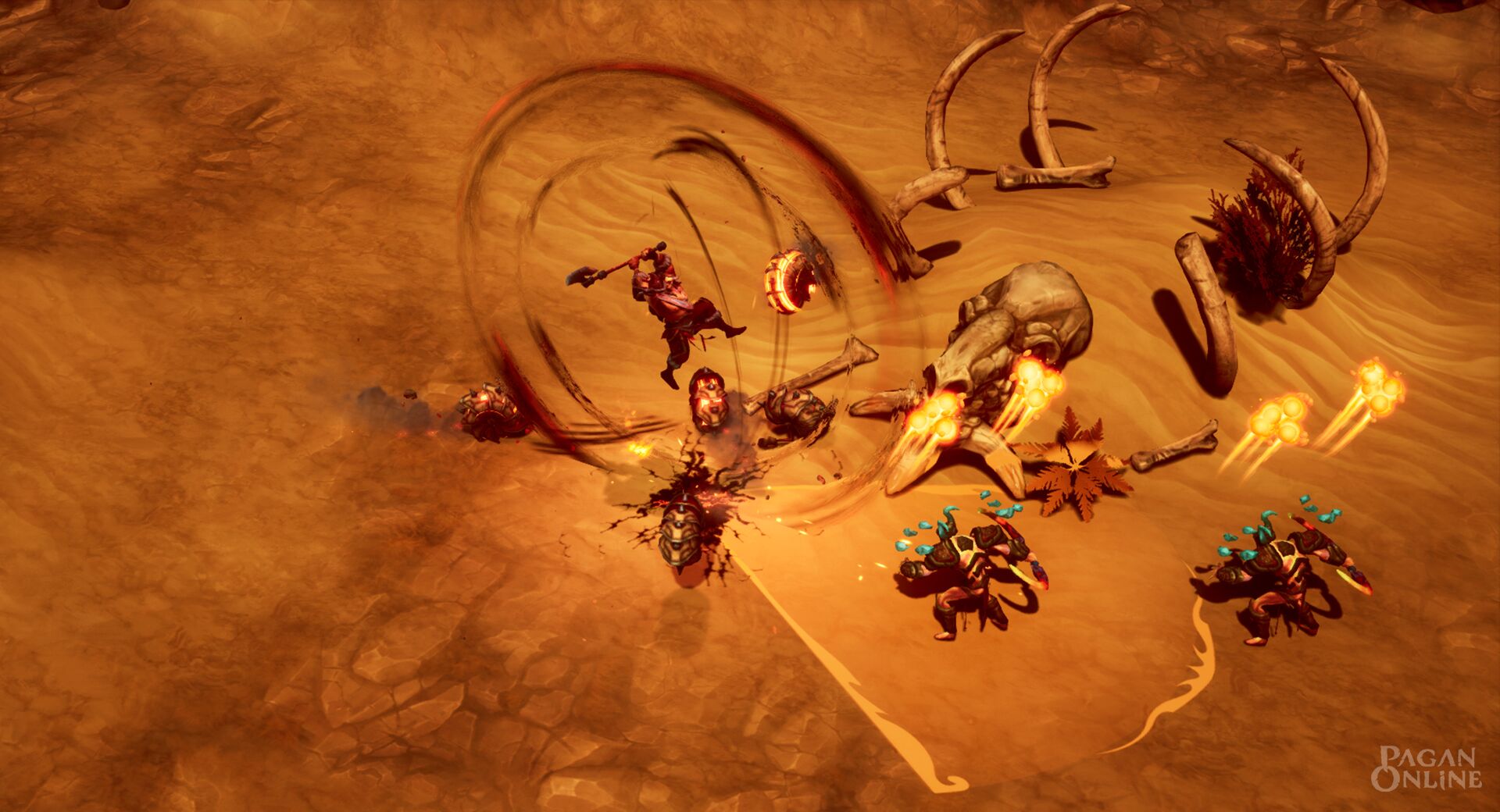Today, Pagan Online, an action RPG inspired by Slavic myths, has received its long-awaited co-op update. The title, developed in collaboration between Mad Head Games and Wargaming, entered early access in mid-April without multiplayer due to technical issues. Now you can play side missions or assassinations (not the main campaign, though) in two-player co-op. With the next patches, the developers promise to roll out four-player co-op along with synergy effects between heroes, special systems for co-op only, special rewards and drops, as well as bug fixes and balance tweaks.
Gameworldobserver.com talked to Uros Banjesevic, Co-founder and Creative Director of Mad Head Games, about paving the way through the jungle, crazy but educated game design decisions, and marrying Slavic and Western cultures.

Uros Banjesevic, Co-founder and Creative Director of Mad Head Games
GWO: What’s it like in Serbia now? Has the spring arrived already?
Uros: Oh, the weather is actually very nice these days. Leaves are green again and random flowers already started blooming – it’s almost tempting to get up from your PC and go out for a walk. ALMOST! (laughing)
GWO: Pagan Online was released in early access last month. What is going on at the studio right now?
Uros: Frenzy mode! After we hadn’t slept for ages to finally launch the product, we just continued staying awake watching every single stream and reading every single review on the internet for a couple of days. Then we got together and prepared the first patch (0.1.1), then we had a small Orthodox Easter break. After that – back to frenzy, working hard to finally ship the co-op mode!
GWO: Emotionally speaking, do you feel differently about this game than about the previous titles from Mad Head Games? What is different?
Uros: Everything! I know that all of your games are like your children and you should love them all the same – but this one is certainly different. It’s the first time we’re making the game for the audience that we’re also part of. That certainly brings emotional connection to a whole new level. It’s unlike anything we worked on previously.

Studio’s history
GWO: What is it like to be a game developer in Serbia?
Uros: Feels like paving the way through the jungle – and it’s not necessarily a bad thing. Being a pioneer is always hard, but it’s also immensely rewarding, and so is the whole gaming industry. It’s been a tough road, building a game, a company and an industry in our country, but I would not change it for anything else. It just made us bolder (figuratively and literally) and… wiser, I guess?
GWO: When you founded the studio back in 2011, what kind of games did you want to make and why?
Uros: We wanted to make a new Diablo. It’s just that we didn’t know how! Still, we wanted to make great games. And although it took us some time to start working on an RPG title, we had so much fun making not just “casual games”, but THE casual games.
You know, we’ve got a lot of awards for casual developer of the year or HOPA (short for “hidden object puzzle adventure”) game of the year. Although it wasn’t our first choice of genre, it still means a lot to us, and still defines us a lot as people and as developers.
GWO: On Reddit, you mention that the studio did a study among your potential players. The key takeaway was that casual digital entertainment lacks “soul.” How do you make a game with a soul? Does a game have to be premium to have a soul?
Uros: No, the game could be f2p, mobile, premium, console, rpg, racing game, farming simulator, whatever. To have a soul, the only prerequisite is to be made with passion, brave bold ideas, and attention to the little details that maybe no one will ever mention.
Soul is made out of love, knowledge and devotion.

GWO: Was it your strategy to first get experience with casual games (including hidden objects) and then proceed to a more serious project?
Uros: We were in early 20’s back in those days, we hardly even knew what strategy was. It was more of a spontaneous decision. We were like “We want to make games and we have no money. What do we do? We do something that pays the bills and something that’s still challenging.”
GWO: What did you learn from making casual games?
Uros: We learned how to finish stuff. We grew together. More as a family than as a team. We set the quality bar sky-high. We learned that we wanted to make the best things in the world, whatever we did.
GWO: Do you think it’s tragic how developers of casual titles often play very different games at home?
Uros: “Tragic” is such a heavy word. I’d rather say it’s a pity that not all of devs could make games they’d like to play, but on the other hand, we are the proof that you just have to strive towards something and be persistent in delivering quality. Luck favors the bold, and they might be making a game of their dreams someday.
On the way to Pagan Online
GWO: Most of your previous titles are hidden objects puzzles. The only other action game you have is a Shoot’em-Up title called Rocking Pilot. When did you decide that it was time to work on a game with a more serious appeal? How and why did this happen?
Uros: Although we hadn’t been making Action games previously as a studio, a lot of people working in Pagan team are industry veterans who worked on AAA titles such as The Witcher, GTA, Driver, Aquanox, Rayman, etc. The idea emerged a long ago, and it just waited for the stars to allign, so that it could kick off with production, which eventually happened.
GWO: You described the idea for this game as crazy. First of all, from a studio named “Mad Head” we wouldn’t expect anything else. But was it crazier than usual? Were you concerned about something?
Uros: We’re concerned about everything! I mean, you start making an ARPG and the first thing you say is “We want that A back to ARPG! We can’t do it with click to move. Gimme that WASD!” How much crazier can it be? We questioned every single pillar that held this genre for decades, built some new ones and destroyed some we found too rusty. Is it brave? I think it is. Is it smart? I still don’t know. Is it crazy? It certainly is.
GWO: Did you consider alternative genres for Pagan Online? Action/RPG is a rather crowded niche.
Uros: No, that’s why crazy decisions have been made – to give another perspective on the genre, and step up as pioneers of a new wave of ARPGs.

GWO: Did you realize that your game would inevitably be compared to Diablo III, the king of the genre? How do you feel about it?
Uros: If you asked me this when I was a kid (Diablo 1 and 2 era) I would just cry and wouldn’t even believe such dream-come-true things could happen. Right now I can articulate this emotion into feeling of pride for the whole team that made their first game in the genre and lived up to being compared to the true legends of the industry. Very few basketball players are being compared to Michael Jordan, very few movies are compared to Godfather. Being in such company is already a first sign that we did something right.
GWO: And what about other popular games of this genre? Which do you like best? Diablo III, Path of Exile, or Titan Quest? Why?
Uros: Personally, even though I played more Diablo 2 than all the other games combined, and even though I was kind of disappointed with Diablo 3 when it came out – I still stayed loyal to Diablo and had a lot of fun with Diablo 3 (especially after Reaper of Souls has been released). Our game design team spent eternity playing Path of Exile and Warframe, and some of games we played don’t even belong to this genre: Quake 3, DOTA 2, and more recently, PUBG and Apex Legends.
GWO: Did the pre-production take long?
Uros: Twice as long as the actual production. We spent 2 years producing the game named Kingewitch (as you can guess, an RPG with only one barbarian hero), and after hooking up with Wargaming, we did everything (literally everything) from scratch in just 15 months.
GWO: What was the toughest choice you had to make during pre-production?
Uros: WASD maybe?
Also, short battles / play sessions were a tough but educated decision.
GWO: Did you have to put together a completely new team, seeing as Action/RPG genre is so different from hidden objects?
Uros: A couple of guys joined the team at that moment, all working on 3d stuff. And supported by our HOPA veterans, Pagan Online (Kingewitch at that time) team was born!
GWO: Who was on the team when the production started?
Uros: It started off with me as a “product owner” (or whatever that title is) plus one 3d modeller, one animator, one tech artist, and two of our best hidden object artists. In the basement of the studio with one tiny window in the corner. We called it Moria, for obvious reasons. Fun times. 
Making Pagan Online
GWO: A friend of mine has recently launched a chain of clinics. He buried himself in debt. He told me that all the risks he could have possibly planned for – even those with a 1% chance of happening – did happen. Including the flood. How unpredictable was the development of Pagan Online?
Uros: A new team, new scope of project, new technology, new market, new publisher as a partner… Everything screamed with trouble. I tend to think we were smart along the way, although I think it’s just pure luck everything turned out fine in the end.
GWO: Did you have those “to hell with it” moments when you wanted to just go back to hidden objects?
Uros: Never really wanted to go back to hidden objects. Once again, it’s not about hidden objects, it’s about me not accepting defeat and reverting to where I was before. Anyway, sure, there were days when nothing seemed right and nothing was working. Then I’d just want to go sleep to replenish health and mana for tomorrow. It worked as intended 97% of the time.
GWO: What was most difficult for the team and you as a manager?
Uros: Like with everything in life, the greatest and the most difficult challenges are also the most rewarding ones. That’s why the most challenging thing for me personally is working with people. This was the first time that the team scaled up to such numbers. Being scattered across 3 offices in 2 different cities in Serbia (Belgrade and Novi Sad), along with publishers in a couple of different time zones, didn’t really help. However, I’d rather sign to be the captain of the Black Pearl than an owner of a simple boat. Tough times I had working with these beautiful people is just a funny way of life saying to you “enjoy your company, you’re learning so much every day.”
GWO: Obviously, you can’t disclose the cost of the development of Pagan Online, but percent-wise, how much more expensive was it than you typical hidden objects games?
Uros: If Pagan Online was an item in Pagan Online, it would be Legacy 7 Legendary with 3K Might, compared to Tier 1 Base item which were our previous games.

Launching Pagan Online and first reaction
GWO: For Battlerite, for example, paid early access was the only way to finish the game, and after that, they made it free-to-play. Why does Pagan Online need paid early access?
Uros: First of all, we didn’t want to bother with any monetization strategies. We just wanted to make a cool minimum viable product of the game, put it to the market and continue evolving it into a full-fledged AAA game. This is the first experience of that kind for us and for Wargaming as well. We both have small teams, doing guerilla development and guerilla marketing. We learn a lot day after day, and of course, paid early access certainly helps the development to continue and speed up.
GWO: The decision to launch in early access makes a lot of sense. Especially against the backdrop of titles like Fallout 76 and Pathfinder. But what are the project’s specific goals before it leaves early access?
Uros: We want to make a proof of concept. Early Access serves to make the best game possible – the game that’s made for the players, by the players. Iteration is the key. So why iterate on our own, when people who are gonna be playing it for hundreds of hours could contribute and follow us on that journey. Listening to their feedback, changing things based on that feedback and hearing their reactions – well, maybe that’s what this job is all about. 
GWO: Many players say that the mechanics and gameplay feel like a mobile free-to-play game. For them, it’s not exactly the best thing. Why do you think that is? Are you planning to do something about it?
Uros: There’s a lot of stuff that certainly can remind someone of a mobile game, although, I think it’s more of players’ fear of a new developer, than a real thing. Having these short battles, Card packs, and UI that’s not gritty as in other ARPG games is certainly one of the strange (but still educated) decisions we made. All of that might feel mobile-ish and wrong, until we prove otherwise to our audience (except for card packs, they suck). We’re gonna do a lot about it, and in the near future. Stay tuned on our Discord to be the first to know.
GWO: You cite slavic mythology as inspiration for the setting of the game. What are the specifically slavic elements to it? Do you think that after the success of The Witcher franchise, this kind of setting can sell well globally?
Uros: We aimed for that cool mixture of Slavic and Western cultures, wrapped into one tasty aesthetic that everyone feels familiar with. We wanted a Slavic tale that looks like a Hollywood movie, and wanted that Western blockbuster to sound like it’s written by an old Russian poet.
GWO: You are off to a good start with Pagan Online. Fans must be excited about co-op! Keep up the good work and good luck!
